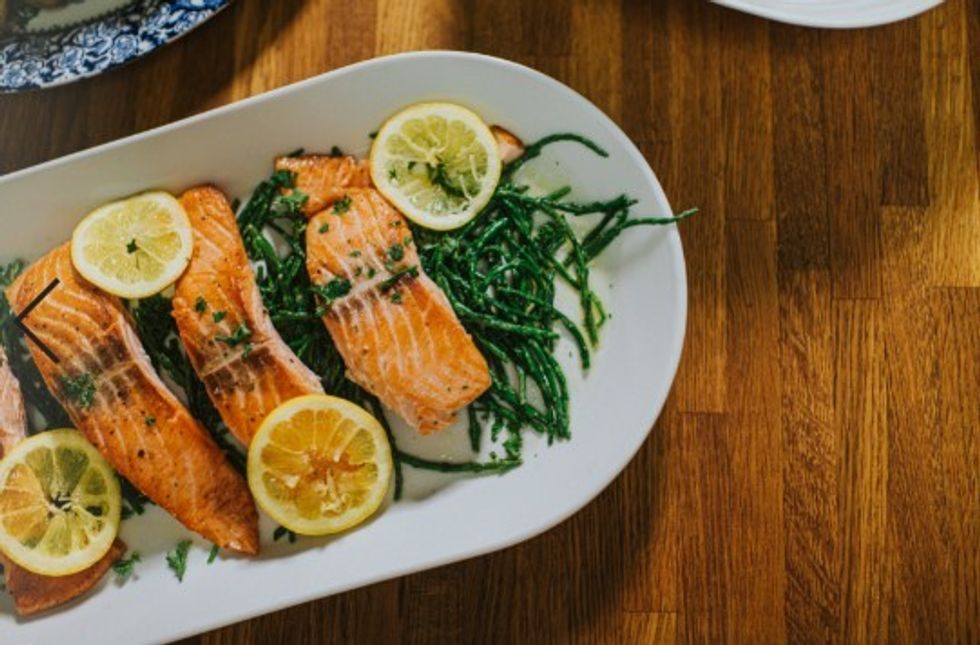Fitness
The three ‘best sources’ of dietary collagen to delay the appearance of wrinkles and sagging

Collagen loss is one of the inevitable consequences of ageing, prompting many physical changes in the skin.
Environmental stressors and genetic makeup are mostly to blame for wrinkling and sagging of the epidermis (skin). Foods also carry influence over the appearance of skin.
Georgi Grogan, Nutritional Health Coach & Founder of Sixways, spoke to GB News about which foods carry the greatest influence over collagen.
According to the expert, fish, seeds and nuts are the top nutritional sources for preserving collagen in the skin, while other processed foods have the opposite effect.
Beauty enthusiasts can counter collagen loss by tweaking their diet
GETTY
The expert noted: “While collagen production begins to decline from the age of 25, there’s a number of things that you do to help support your body’s natural collagen production, as well as foods to avoid the slow down this process and keep fine lines at bay.”
Fish
Fish is high in the mineral selenium, a mineral and antioxidant that plays a crucial role in DNA synthesis and repair.
Marine collagen derived from fish is rich in specific amino acids essential for body collagen synthesis.
“Fish is considered one of the best sources of collagen primarily because it contains a type of collagen known as marine collagen,” explained Georgi.
“Marine collagen is derived from the skin, scales and bones of fish and is highly bioavailable, meaning it is easily absorbed and utilised by the body.
“These amino acids play a crucial role in maintaining skin elasticity, hydration and overall skin health.”
Vitamin C
Like collagen, the vitamin C present in food exerts effects on the skin that are hard to mimic with man-made skin products.
It is particularly abundant in citrus fruits like oranges, grapefruits and lemons, and helps skin repair by boosting collagen production.
“Incorporating berries into your diet can help to support healthy skin and boost collagen production,” explained Georgi.
“They’re packed with antioxidants and vitamin C which helps to protect collagen from damage while supporting its synthesis.”
Nuts and seeds
If you’re looking for a way to boost your breakfast or lunches, nuts and seeds are the perfect addition to smoothies, oats and salads.
“Almonds and walnuts provide zinc, copper and other minerals that help to aid collagen formation, encourage hair growth and support glowing skin from within,” noted Georgi.
“As well as foods that benefit your skin health, certain foods can significantly hinder collagen production in the body, impacting skin elasticity, joint health and overall tissue repair.”
LATEST DEVELOPMENTS

Fish supports better collagen production in the skin
GETTY
Foods to avoid
Consuming foods that are high in refined sugar can lead to glycation, a process where sugar molecules damage collagen and elastin fibres.
To prevent this from happening, try sticking to foods with natural sugars such as fruit, instead of highly processed sugar drinks, snacks and desserts.
“While there is a lot of discussion regarding ultra-processed foods and the impact they have on our health, they are also key contributors to fine lines and premature ageing,” explained Georgi.
“Often high in unhealthy fats and sugars, these processed foods promote inflammation and accelerate the breakdown of collagen. This can lead to dull, dry and lack-lustre skin and hair.”
Similarly, foods high in trans fats, commonly found in fried and processed foods, promote inflammation that interferes with collagen synthesis and accelerates skin ageing.
“Excessive alcohol consumption also disrupts collagen production by dehydrating the skin and impairing nutrient absorption crucial for collagen formation,” added the expert.
“Lastly, insufficient protein intake, particularly lacking in essential amino acids necessary for collagen synthesis, can hinder the body’s ability to repair and maintain connective tissues effectively.”










